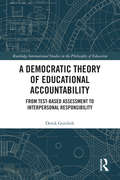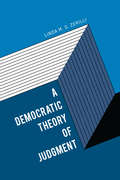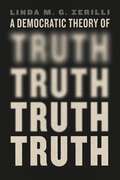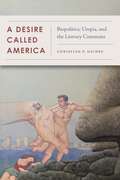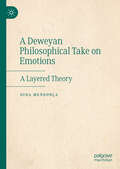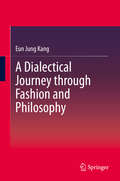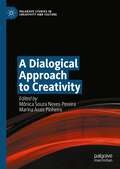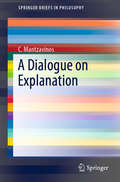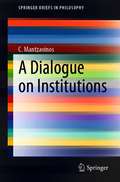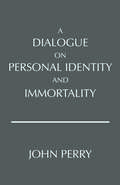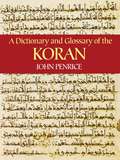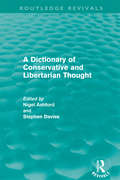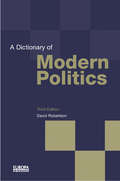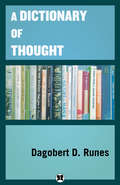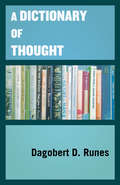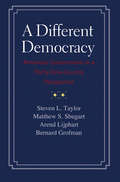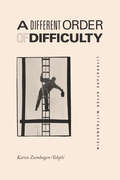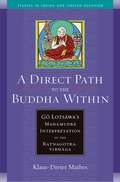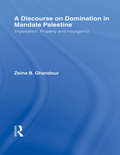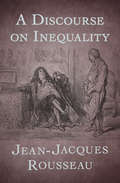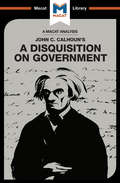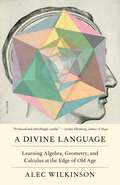- Table View
- List View
A Democratic Theory of Educational Accountability: From Test-Based Assessment to Interpersonal Responsibility (Routledge International Studies in the Philosophy of Education)
by Derek GottliebThis insightful text offers a detailed account of the historical development of educational accountability in the US public education system. In doing so, it diagnoses the unforeseen consequences arising from a centralized, technocratic implementation of the concept, and calls for a radical re-thinking in how our democratic responsibilities translate into the provision, measurement, and conceptualization of education. Drawing from the works of scholars including Stanley Cavell, Linda Zerilli, Daniel Koretz, and James Scott, A Democratic Theory of Educational Accountability illustrates the way in which "educational accountability" has foregrounded centralized measures of "success" to the point of perversity. Through nuanced political theory and philosophical arguments, the text demonstrates how test-based measures have rendered the holistic aims of education futile, resulting in an education system of "box-checking" and "rule-following". Ultimately calling for a new imagination of how our democratic responsibilities are enacted in schools and communities, Gottlieb illustrates how accountability can be used for good, to ensure that our schools nurture talent, cultivate social mobility, and engage with local needs. This text will be of great interest to graduate and postgraduate students, researchers, academics, and libraries in the field of philosophy of education, educational policy, assessment & testing and democratic theory.
A Democratic Theory of Judgment
by Linda M.G. ZerilliIn this sweeping look at political and philosophical history, Linda M. G. Zerilli unpacks the tightly woven core of Hannah Arendt’s unfinished work on a tenacious modern problem: how to judge critically in the wake of the collapse of inherited criteria of judgment. Engaging a remarkable breadth of thinkers, including Ludwig Wittgenstein, Leo Strauss, Immanuel Kant, Frederick Douglass, John Rawls, Jürgen Habermas, Martha Nussbaum, and many others, Zerilli clears a hopeful path between an untenable universalism and a cultural relativism that forever defers the possibility of judging at all. Zerilli deftly outlines the limitations of existing debates, both those that concern themselves with the impossibility of judging across cultures and those that try to find transcendental, rational values to anchor judgment. Looking at Kant through the lens of Arendt, Zerilli develops the notion of a public conception of truth, and from there she explores relativism, historicism, and universalism as they shape feminist approaches to judgment. Following Arendt even further, Zerilli arrives at a hopeful new pathway—seeing the collapse of philosophical criteria for judgment not as a problem but a way to practice judgment anew as a world-building activity of democratic citizens. The result is an astonishing theoretical argument that travels through—and goes beyond—some of the most important political thought of the modern period.
A Democratic Theory of Truth
by Linda M. ZerilliA critique of the concept of truth presupposed by the post-truth debate—and a bold new vision for a more pluralistic citizenry. We say that we live in a “post-truth” era because disinformation threatens our confidence in the existence of a shared public world. Affirming objective truth may, therefore, seem necessary to save democracy. According to political theorist Linda M. G. Zerilli, such affirmation can stifle political debate and silence dissent. In fact, Zerilli argues that the unqualified insistence on objective truth is as dangerous for democracy as denying it. Drawing on Arendt, Foucault, and Wittgenstein, A Democratic Theory of Truth challenges the concept of truth presupposed by the post-truth debate. It argues that we, the people, have an essential role in discovering and evaluating any truth relevant to the political realm. The result is a striking defense of plurality, dissent, and opinion in contemporary democratic societies.
A Desire Called America: Biopolitics, Utopia, and the Literary Commons
by Christian HainesCritics of American exceptionalism usually view it as a destructive force eroding the radical energies of social movements and aesthetic practices. In A Desire Called America, Christian P. Haines confronts a troubling paradox: Some of the most provocative political projects in the United States are remarkably invested in American exceptionalism. Riding a strange current of U.S. literature that draws on American exceptionalism only to overturn it in the name of utopian desire, Haines reveals a tradition of viewing the United States as a unique and exemplary political model while rejecting exceptionalism’s commitments to nationalism, capitalism, and individualism. Through Walt Whitman, Emily Dickinson, William S. Burroughs, and Thomas Pynchon, Haines brings to light a radically different version of the American dream—one in which political subjects value an organization of social life that includes democratic self-governance, egalitarian cooperation, and communal property.A Desire Called America brings utopian studies and the critical discourse of biopolitics to bear upon each other, suggesting that utopia might be less another place than our best hope for confronting authoritarianism, neoliberalism, and a resurgent exclusionary nationalism.
A Deweyan Philosophical Take on Emotions: A Layered Theory
by Dina MendonçaThis book puts forward a layered theory of emotions, which argues that emotional processes are best understood as occurrences that happen within complex emotional situational scenarios that integrate different and interconnected layers. According to this theory, there is an underlying logic of emotions which is more akin to a creative endeavor than to a fixed and mechanical structure. The book is divided in three parts. The first part provides the Deweyan historical background and shows how it gives rise to the hypothetical suggestion of the Layered Theory of Emotions. After laying down the Layered Theory of Emotions, the following chapters show how Dewey’s philosophical work grounds the theoretical suggestion. The second part of the book presents various insights that spring from the proposed theory. Among other things, it will show the importance of some new distinctions, such as meta-emotions and emotional depth, and provide a different understanding of previous emotional categories, such emotional intentionality and emotional habits. Finally, the third part of the book concludes by drawing some consequences of the layered theory of emotions for philosophy of mind, and for the general philosophical task. The book hopes to raise thought provoking questions and point out possible future research directions to deepen Dewey’s insightful scholarship, and Emotion Theory.
A Dialectical Journey through Fashion and Philosophy
by Eun Jung KangThis book takes an in-depth look at the integration of fashion and philosophy. It challenges the deeply rooted prejudice or misconception that fashion is a field limited to body-oriented and appearance-related themes and practices. It also reveals that fashion is intermeshed with distinctively modern issues that belong to the realm of the mind as well as the body. In doing so, it refashions philosophy and philosophizes fashion, which ultimately amount to the same thing. The book argues that while the philosophization of fashion can give a clearer understanding of some esoteric areas of philosophy and fashion’s close connection to modern societies and politics, it also shows that philosophy can assist in redeeming fashion from the objective, bodily world, positioning it as an indispensable part of the humanities. This is because fashion manifests critical aspects of human culture in our time, and is an expression of the zeitgeist, which is interwoven with the unfolding of history. This book will be highly relevant to students and researchers in fashion studies who are looking for the theoretical underpinnings and insights for their own work. It will also be of keen interest to scholars in the field of philosophy who are seeking to apply philosophical concepts to both everyday life and our empirical world.
A Dialogical Approach to Creativity (Palgrave Studies in Creativity and Culture)
by Marina Assis Pinheiro Mônica Souza Neves-PereiraThis book takes an epistemological and theoretical stance in investigating the phenomenon of creativity and its processes. Creativity is analyzed through the lens of cultural psychology, in which psychological processes emerge over the course of life, and can only be understood in relation to the subject’s history and life experiences. Dialogism is presented as central for the constitutive dynamics of the developing subject and the emergence of creative actions through the expression of human agency. The authors highlight Bakhtinian dialogism and its developments in the scientific field of psychology and related areas to shed new light on creativity and its processes. The authors argue this will enable a better understanding of creativity in its development and emergence, and its impact on individuals and society.
A Dialogue on Explanation (SpringerBriefs in Philosophy)
by Chrysostomos MantzavinosThis book introduces a panorama of the philosophical theory of explanation. Written as a philosophical dialogue between two interlocutors, Philip and a student, it presents a defense of the position of explanatory pluralism. The fictional dialogue takes place on Cape Sounion, near Athens, where the two interlocutors are enjoying the view over the Aegean Sea. An initial exchange of arguments leads to a dialogue unfolding the development of the contemporary philosophical theory of explanation. The second part of the dialogue is devoted to an exchange of arguments on explanatory pluralism as a novel approach to the philosophical theory of explanation. The two also discuss historical cases as well as the ways of achieving explanatory progress in science. We are all philosophers and we develop our own philosophy by exchanging views and arguments. The dialogue form is and should remain the principal form of philosophizing, since ideas do not merely exist – they develop. This is certainly the case in real-world philosophical interaction, and as this book aptly demonstrates, it can also be the case in written philosophical exposition.
A Dialogue on Institutions (SpringerBriefs in Philosophy)
by C. MantzavinosThis book consists of a dialogue between two interlocutors, Pablo and a student, who discuss a great range of issues in social philosophy and political theory, and in particular, the emergence, working properties and economic effects of institutions. It uses the dialogical form to make philosophy more accessible, but also to show how ideas develop through intellectual interaction. The fact that one of the interlocutors is the "student" in a place in the real world makes the dialogue quasi-fictive in character and enables the active engagement of the reader. After all, we are all philosophers and we develop our own philosophy by exchanging views and arguments. The dialogue form is and should remain the principal form of philosophizing, since ideas, like butterflies, do not merely exist – they develop. This is certainly the case in actual philosophical interaction, and it can be the case in written philosophical exposition. Although the dialogue does not presuppose prior acquaintance with the respective philosophical and social scientific literature under discussion in this book, it makes arguments more accessible, and conveys the feeling that there are no definite solutions to philosophical problems.
A Dialogue on Personal Identity and Immortality
by John PerryPerry's excellent dialogue makes a complicated topic stimulating and accessible without any sacrifice of scholarly accuracy or thoroughness. Professionals will appreciate the work's command of the issues and depth of argument, while students will find that it excites interest and imagination. --David M. Rosenthal, CUNY, Lehman College
A Dictionary and Glossary of the Koran
by John PenriceIt is every Muslim's duty to read the Koran and try to understand it, which can be a problematic task for those unacquainted with Arabic. The study and appreciation of Arabic literature likewise demands a thorough familiarity with the Koran; the majority of works by Muslim writers abound in allusions to its precepts and quotations from its pages. The sacred text's purity of style and elegance of diction make it the standard of Arabic.This classic guide to one of the world's most widely read books permits everyone, Muslim and non-Muslim alike, to understand the Koran -- even those with no prior knowledge of Arabic. Geared toward beginners, it was written to answer the need for an American version of the Koran in contemporary English. Each word is listed under its verbal root, grouping words without roots alphabetically, and numerous explanations of the text appear throughout to help beginners master some inevitable difficulties and to assist more advanced readers of Arabic in solving problems.
A Dictionary of Conservative and Libertarian Thought (Routledge Revivals)
by Stephen Davies Nigel AshfordFirst published in 1991, this is a reissue of the path-breaking Dictionary of Conservative and Libertarian Thought, the first book to examine the ideals and arguments produced by the intellectual traditions of both conservatism and classical liberalism. Covering the ideas of many such distinguished thinkers as Hayek, Scruton, Friedman and Buchanan, the volume provides a valuable survey of the historical development of both schools of thought in all of the major western countries and their contributions to contemporary debates. From American Conservatism to French Liberalism, Invisible Hand to Organic Society, from Scientism to Scepticism and Utopianism to Voluntarism, this is a vital work whose reissue will be welcomed as much by the keen layperson as by students of political science, the history of philosophy, economics and public policy.
A Dictionary of Modern Politics
by David Professor RobertsonA comprehensive guide to the complex ideology/terminology which surrounds the world of politics.* Well over 500 extensive definitions* Defines political theories, dogmas and phraseologies* Terms such as Pacifism, Proportional Representation, Jihad, Son of Star Wars, Third Way and Consensual are explained clearly and succinctly* Invaluable for anyone concerned with politics or current affairs.
A Dictionary of Thought
by Karl Marx Dagobert D. RunesThis dictionary, from the pen of the well-known philosopher Dagobert D. Runes, is offered as an attempt to define the borderlines of human thinking and human morality. In 152 pages organized alphabetically, Dr. Runes has created a dictionary of his own philosophical musings indexed by evocative words. Each word is followed by up to several single sentence aphorisms and occasionally a short essay. As a collection, they cover an extremely broad range of topics. In his search for real verities and true humanity, he takes the reader on an arduous thought-provoking voyage through the depths of the mind. This type of soul-searching philosophy, unburdened by traditional manner and terminology, is sometimes baffling, frequently of melancholy character, but almost always fascinating and inspiring.
A Dictionary of Thought
by Dagobert D. RunesAn A-to-Z collection of thoughtful aphorisms and ruminations by the philosopher and founder of the Philosophical Library. In this unique dictionary, philosopher Dagobert D. Runes attempts to define the contours of human thinking and morality. In a series of terms organized alphabetically, Runes systematically sets out his own musings on topics ranging from Abhorrence and Ability to Zeal, Zen, and Zero. Each word is followed by up to several single-sentence aphorisms and occasionally a short essay. In his search for real verities and true humanity, Runes takes the reader on a thought-provoking voyage through the depths of the human mind. This is philosophy as intellectual soul-searching, unburdened by traditional manner and terminology. Sometimes baffling and frequently melancholy, it is always fascinating and inspiring.
A Different Democracy
by Bernard Grofman Arend Lijphart Steven L. Taylor Matthew Soberg ShugartFour distinguished scholars in political science analyze American democracy from a comparative point of view, exploring how the U.S. political system differs from that of thirty other democracies and what those differences ultimately mean for democratic performance. This essential text approaches the following institutions from a political engineering point of view: constitutions, electoral systems, and political parties, as well as legislative, executive, and judicial power. The text looks at democracies from around the world over a two-decade time frame. The result is not only a fresh view of the much-discussed theme of American exceptionalism but also an innovative approach to comparative politics that treats the United States as but one case among many. An ideal textbook for both American and comparative politics courses.
A Different Kind of Luxury
by Andy CouturierRaised in the tumult of Japan's industrial powerhouse, the eleven men and women profiled in this book have all made the transition to sustainable, fulfilling lives. They are today artists, philosophers, and farmers who reside deep in the mountains of rural Japan. Their lives may be simple, yet they are surrounded by the luxuries of nature, art, contemplation, delicious food, and an abundance of time. For example: Atsuko Watanabe is an environmentalist and home-schooler who explores Christian mysticism while raising her two daughters in an old farmhouse Akira Ito is an ex-petroleum engineer who has become a painter and children's book illustrator and explores the role of chi (life energy) in the universe through art and music Kogan Murata grows rice and crafts elegant bamboo flutes that he plays for alms in the surrounding villages Jinko Kaneko is a fine artist and fabric dyer who runs a Himalayan-style curry restaurant in the Japan Alps By presenting the journeys of these ordinary--yet exceptional--people, Andy Couturier shows how we too can travel a meaningful path of living simply, with respect for our communities and our natural resources. When we leave behind the tremendous burdens of wage labor, debt, stress, and daily busyness, we grow rich in a whole new way. These Japanese are pioneers in a sense; drawing on traditional Eastern spiritual wisdom, they have forged a new style of modernity, and in their success is a lesson for us all: live a life that matters.Andy Couturier is an essayist, poet, and writing teacher. He lived in Japan for four years where he taught, was a journalist, and worked on environmental causes. He lives in the San Francisco Bay Area.
A Different Order of Difficulty: Literature after Wittgenstein
by Karen Zumhagen-YekpléIs the point of philosophy to transmit beliefs about the world, or can it sometimes have higher ambitions? In this bold study, Karen Zumhagen-Yekplé makes a critical contribution to the “resolute” program of Wittgenstein scholarship, revealing his Tractatus Logico-Philosophicus as a complex, mock-theoretical puzzle designed to engage readers in the therapeutic self-clarification Wittgenstein saw as the true work of philosophy. Seen in this light, Wittgenstein resembles his modernist contemporaries more than might first appear. Like the literary innovators of his time, Wittgenstein believed in the productive power of difficulty, in varieties of spiritual experience, in the importance of age-old questions about life’s meaning, and in the possibility of transfigurative shifts toward the right way of seeing the world. In a series of absorbing chapters, Zumhagen-Yekplé shows how Kafka, Woolf, Joyce, and Coetzee set their readers on a path toward a new way of being. Offering a new perspective on Wittgenstein as philosophical modernist, and on the lives and afterlives of his indirect teaching, A Different Order of Difficulty is a compelling addition to studies in both literature and philosophy.
A Direct Path to the Buddha Within
by Klaus-Dieter MathesMaitreya's Ratnagotravibhaga, also known as the Uttaratantra, is the main Indian treatise on buddha nature, a concept that is heavily debated in Tibetan Buddhist philosophy. In A Direct Path to the Buddha Within, Klaus-Dieter Mathes looks at a pivotal Tibetan commentary on this text by Go Lotsawa Zhonu Pal, best known as the author of the Blue Annals. Go Lotsawa, whose teachers spanned the spectrum of Tibetan schools, developed a highly nuanced understanding of buddha nature, tying it in with mainstream Mahayana thought while avoiding contested aspects of the so-called empty-of-other (zhentong) approach. In addition to translating key portions of Go Lotsawa's commentary, Mathes provides an in-depth historical context, evaluating Go's position against those of other Kagyu, Nyingma, and Jonang masters and examining how Go Lotsawa's view affects his understanding of the buddha qualities, the concept of emptiness, and the practice of mahamudra.
A Discourse on Domination in Mandate Palestine: Imperialism, Property and Insurgency
by Zeina B. GhandourBritish discourse during the Mandate, with its unremitting convergence on the problematic ‘native question’, and which rested on racial and cultural theories and presumptions, as well as on certain givens drawn from the British class system, has been taken for granted by historians. The validity of cultural representations as pronounced within official correspondence and colonial laws and regulations, as well as within the private papers of colonial officials, survives more or less intact. There are features of colonialism additional to economic and political power, which are glaring yet have escaped examination, which carried cultural weight and had cultural implications and which negatively transformed native society. This was inevitable. But what is less inevitable is the subsequent collusion of historians in this, a (neo-) colonial dynamic. The continued collusion of modern historians with racial and cultural notions concerning the rationale of European rule in Palestine has postcolonial implications. It drags these old notions into the present where their iniquitous barbarity continues to manifest. This study identifies the symbolism of British officials’ discourse and intertwines it with the symbolism and imagery of the natives’ own discourse (from oral interviews and private family papers). At all times, it remains allied to those writers, philosophers and chroniclers whose central preoccupation is to agitate and challenge authority. This, then, is a return to the old school, a revisiting of the optimistic, vibrant rhetoric of those radicals who continue to inspire post and anti-colonial thinking. In order to dismantle, and to undo and unwrite, A Discourse on Domination in Mandate Palestine holds a mirror up to the language of the Mandatory by counteracting it with its own integrally oppositional discourse and a provocative rhetoric.
A Discourse on Inequality: A Discourse On The Origin Of Inequality, And A Discourse On Political Economy
by Jean-Jacques RousseauA fascinating examination of the relationship between civilization and inequality from one of history&’s greatest minds The first man to erect a fence around a piece of land and declare it his own founded civil society—and doomed mankind to millennia of war and famine. The dawn of modern civilization, argues Jean-Jacques Rousseau in this essential treatise on human nature, was also the beginning of inequality. One of the great thinkers of the Enlightenment, Rousseau based his work in compassion for his fellow man. The great crime of despotism, he believed, was the raising of the cruel above the weak. In this landmark text, he spells out the antidote for man&’s ills: a compassionate revolution to pull up the fences and restore the balance of mankind. This ebook has been professionally proofread to ensure accuracy and readability on all devices.
A Discourse on Property: John Locke and his Adversaries
by James TullyJohn Locke's theory of property is perhaps the most distinctive and the most influential aspect of his political theory. In this book James Tully uses an hermeneutical and analytical approach to offer a revolutionary revision of early modern theories of property, focusing particularly on that of Locke.
A Disquisition on Government
by Etienne Stockland Jason XidiasNineteenth-century American politician John C. Calhoun occupies a paradoxical place in the history of political thought – and of critical thinking. On one hand, he is remembered as a committed advocate of slavery, consistently espousing views that are now considered indefensible and abhorrent. On the other, the political theories that Calhoun used to defend the social injustice of slavery have become the basis of the very systems by which modern democracies defend minority rights. Despite being crafted in defence of a system as unjust as slavery, the arguments that Calhoun expressed about minority rights in democracies in A Disquisition On Government remain an excellent example of how problem solving skills and reasoning can come together. The problem, for Calhoun, was both specific and general. As matters stood in the late 1840s, the majority of American states were anti-slavery, with only the minority, Southern states remaining pro-slavery. This boiled down to a crucial issue with democracy: the US government should not, Calhoun argued, only respect the wishes of the majority. Instead, democratic government must aim to harmonize diverse groups and their interests – governing, in so far as possible, for everyone. His analysis of how the Southern states could protect what he saw as their right to keep slaves led Calhoun to formulate solutions to the problem of ‘the tyranny of the majority’ that have since helped defend far worthier minority views.
A Dissertation On The Passions: The Natural History Of Religion
by David Hume Tom L. BeauchampDavid Hume (1711-1776) is one of the greatest of philosophers. Today he probably ranks highest of all British philosophers in terms of influence and philosophical standing. His philosophical work ranges across morals, the mind, metaphysics, epistemology, religion, and aesthetics; he had broadinterests not only in philosophy as it is now conceived but in history, politics, economics, religion, and the arts. He was a master of English prose. <P><P> The Clarendon Hume Edition will include all of his works except his History of England and minor historical writings. It is the only thorough critical edition, and will provide a far more extensive scholarly treatment than any previous editions. This edition (which has been in preparation since the 1970s) offers authoritative annotation, bibliographical information, and indexes, and draws upon the major advances in textual scholarship that have been made since the publication of earlier editions--advances both in the understanding of editorial principle and practice and in knowledge of the history of Hume's own texts. <P> In this volume, Tom Beauchamp presents two essays from Four Dissertations (1757), the last philosophical work written by Hume, which was subsequently revised by the philosopher in the remaining years of his life. Whilst the bulk of A Dissertation on the Passions was extracted from passages in ATreatise of Human Nature, The Natural History of Religion was an original work when published in 1757, as well as the only major work devoted exclusively to the subject of religion that Hume published in his lifetime. Together with Hume's earlier work on religious topics, this essay drewconsiderable philosophical commentary from his contemporaries. The last edition of the two works in this volume seen through the press by Hume himself appeared in 1772. It provides the copy-text for this critical edition. The Editor's primarily historical Introduction discusses the genesis, revision, and reception of these two dissertations, which went into ten editions at the author's hand. It will appeal to scholars across many disciplines.
A Divine Language: Learning Algebra, Geometry, and Calculus at the Edge of Old Age
by Alec WilkinsonA New York Times Book Review Editors' Choice"Wilkinson has accomplished something more moving and original, braiding his stumbling attempts to get better at math with his deepening awareness that there’s an entire universe of understanding that will, in some fundamental sense, forever lie outside his reach." —Jennifer Szalai, The New York Times "There is almost no writer I admire as much as I do Alec Wilkinson. His work has enduring brilliance and humanity.” —Susan Orlean, author of The Library Book A spirited, metaphysical exploration into math's deepest mysteries and conundrums at the crux of middle age.Decades after struggling to understand math as a boy, Alec Wilkinson decides to embark on a journey to learn it as a middle-aged man. What begins as a personal challenge—and it's challenging—soon transforms into something greater than a belabored effort to learn math. Despite his incompetence, Wilkinson encounters a universe of unexpected mysteries in his pursuit of mathematical knowledge and quickly becomes fascinated; soon, his exercise in personal growth (and torture) morphs into an intellectually expansive exploration.In A Divine Language, Wilkinson, a contributor to The New Yorker for over forty years, journeys into the heart of the divine aspect of mathematics—its mysteries, challenges, and revelations—since antiquity. As he submits himself to the lure of deep mathematics, he takes the reader through his investigations into the subject’s big questions—number theory and the creation of numbers, the debate over math’s human or otherworldly origins, problems and equations that remain unsolved after centuries, the conundrum of prime numbers. Writing with warm humor and sharp observation as he traverses practical math’s endless frustrations and rewards, Wilkinson provides an awe-inspiring account of an adventure from a land of strange sights. Part memoir, part metaphysical travel book, and part journey in self-improvement, A Divine Language is one man’s second attempt at understanding the numbers in front of him, and the world beyond.
